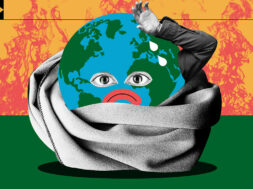
Roving Periscope: Earth is sick; climate change hits 86% people worldwide, says study
Virendra Pandit
New Delhi: It is a global disaster in the making. An alarming 86 percent of the world’s population is already affected by sub-global climate change, a study said on Thursday, as it warned the planet is sick.
According to a study published in Nature, humans have already crossed 7 of 8 “planetary boundaries” that identify major Earth systems at risk of instability because of human activity.
A team of scientists looked at these systems including the climate, biodiversity, and freshwater to determine the limits of what they called a “safe operating space” for civilization. But they stopped short of analyzing how busting past these limits might harm people, particularly the poor and vulnerable.
The researchers expressed the hope that businesses and governments will develop tools to align their practices with science-set thresholds, the media reported.
“We simply need to have science-based targets well beyond climate for all the planetary boundaries, in order to have a stable and resilient Earth system – and also to handle the climate crisis,” said Johan Rockstrom, Director of the Potsdam Institute for Climate Impact Research in Germany and a co-author of the new and original works.
The fresh analysis also includes criteria for justice, along three dimensions—affecting the millions of people at risk today, the billions coming in the future, and the world’s countless species and ecosystems.
For some Earth systems, like the climate, this fairness analysis requires more stringent limits than geophysical stability factors alone would. The 1.5-degree centigrade (1.5C) warming limit enshrined in the Paris Agreement, already on life support, is too high given humanitarian concerns as evidenced by tens of millions of people now exposed to dangerously high temperatures.
The world has warmed by 1.2C since industrialization. By 1.5C, the scientists find, more than 200 million people – mostly poor, vulnerable, and marginalized communities – could face unprecedented heat. Shrinking the global average temperature increase below 1C is their target, but because that’s not possible on a visible time scale, countries will have to deal with the consequences. And that means “adaptations and compensations to reduce sensitivity to harm and vulnerability will be necessary.”
They called for international compensation for poorer countries’ “loss and damage” sustained during extreme weather events, as agreed to at last year’s UN climate talks.
The scale of effort required to meet these challenges is unprecedented. “Nothing less than a just global transformation across all Earth System Boundaries (ESBs) is required to ensure human well-being.”
Energy, food, cities, and other sectors require rebooted politics, economics, and technology. “It requires a leap in our understanding of how justice, economics, technology, and global cooperation can be furthered in the service of a safe and just future.”
The 51 authors of the report are associated with the Earth Commission, a group of natural and social scientists co-founded by Rockstrom to generate science that can inform organizations, such as the Science Based Targets Network, that develop guidance for companies and cities. The study strives to quantify planet-scale changes that “are mostly driven by social and economic systems run on unsustainable resource extraction and consumption.”
To address air pollution, their target is to minimize the difference in the concentration of aerosols between the Northern and Southern Hemispheres, while establishing an upper bound for harmful small particle pollution. Aerosols from both natural and human sources, from volcanoes to tailpipes, cause illness and premature death around the world.
Essentially, the researchers seek to do for all of the Earth systems what’s already happened for climate change: Generate scientific baselines that standard-setting organizations and governments can use to help companies, cities, and others ensure their operations don’t contribute to further systemic environmental change or human harm. The boundaries may include but are not the same as “tipping points,” or thresholds beyond which the planet perpetuates change with or without human input.
“The ultimate definition of justice today is the right of every human being, particularly future generations, to have a stable planet – to be born on a planet which is at least as livable as the planet where his or her parents were born,” Rockstrom said.













